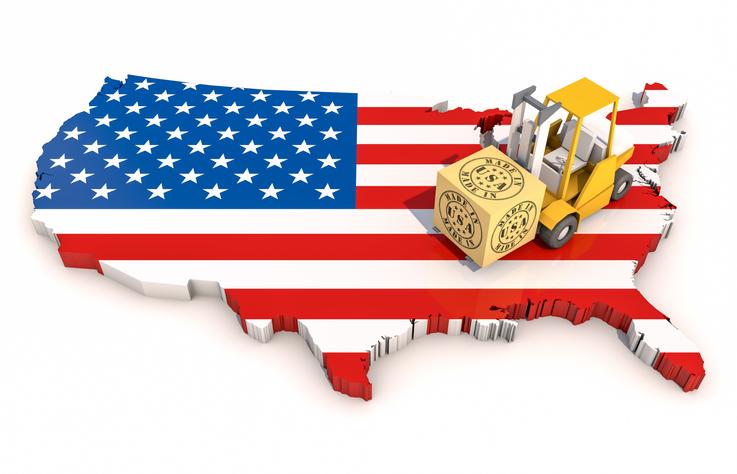Contributing Writer
- FMA
- The Fabricator
- FABTECH
- Canadian Metalworking
Categories
- Additive Manufacturing
- Aluminum Welding
- Arc Welding
- Assembly and Joining
- Automation and Robotics
- Bending and Forming
- Consumables
- Cutting and Weld Prep
- Electric Vehicles
- En Español
- Finishing
- Hydroforming
- Laser Cutting
- Laser Welding
- Machining
- Manufacturing Software
- Materials Handling
- Metals/Materials
- Oxyfuel Cutting
- Plasma Cutting
- Power Tools
- Punching and Other Holemaking
- Roll Forming
- Safety
- Sawing
- Shearing
- Shop Management
- Testing and Measuring
- Tube and Pipe Fabrication
- Tube and Pipe Production
- Waterjet Cutting
Industry Directory
Webcasts
Podcasts
FAB 40
Advertise
Subscribe
Account Login
Search
Final resolution on Made in America requirements for infrastructure project nears
White House manages to irritate parties on all sides of the debate
- By Stephen Barlas
- April 7, 2023

The White House is close to deciding just what Made in America means for metals content used in federally funded infrastructure projects. klenger/iStock/Getty Images
The White House is about to weigh in on the war over waivers.
U.S. steel producers are currently fighting domestic steel companies over “Made in America” rules for infrastructure projects. The White House Office of Management and Budget (OMB) is weeding through comments on its proposed rule issued in February as to when foreign iron and steel can be used in infrastructure projects funded by the Infrastructure Investment and Jobs Act (IIJA).
We have covered earlier skirmishes as various federal agencies have adopted loopholes, called waivers, allowing contractors under IIJA funding to use foreign iron and steel. A specific provision in the IIJA called the Build America, Buy America Act (BABA), which set “Made in America” requirements, included a couple of instances where domestic iron and steel would not have to be used, such as when they were unavailable or too costly.
Many federal agencies have issued a variety of waivers so that U.S. companies can quickly ramp up IIJA projects without having to rejigger entire supply chains and weed out foreign suppliers, thus complying with BABA requirements. These exceptions have, for example, allowed foreign iron and steel to be used when they are “minor components” of a product, generally accounting for less than 5% of the product’s composition. These projects include products with some or lots of iron, steel, and aluminum, such as heating and cooling products and pipes of all sorts, to name a few.
Another issue revolves around determining when a manufactured product is “predominantly iron and steel.” That is another hornet’s nest.
Aero-Mod Inc., located in Manhattan, Kan., worries about meeting BABA rules. Aero-Mod, a manufacturer of equipment for wastewater treatment plants, including components such as aeration diffuser assemblies; blowers; valve, water, and air transfer piping; handrails; and air compressors, is concerned that the wide-ranging minor component exclusion could eliminate it from many infrastructure projects.
“Would BABA consider the U.S.-made component requirements as a full-process system, or would each individual component need to meet the designated U.S.-made requirements?” Aero-Mod asked the OMB.
OMB delivered its final draft guidance on the BABA in February, and as a result, the directives could end up altering the 19 iron and steel waivers previously issued by the U.S. Department of Agriculture, the U.S. Department of Commerce, the U.S. Department of Energy, the Federal Emergency Management Agency, the Department of Housing and Urban Development, and the Department of Transportation.
Meanwhile, these actions continue to ruffle feathers outside typical domestic metals supply chains. This issue of when foreign products can be used in IIJA projects has created front-page headlines with regard to IIJA tax credits for the owners of electric vehicles. Also, the concern that foreign-made products, whether iron or steel, could be barred from infrastructure programs has generated considerable opposition from European officials, who see new barriers being raised to exports of their products to the U.S.
The U.S. Chamber of Commerce raised that concern in its opposition to the OMB’s proposed rule in February. The business advocacy group argued the OMB’s restrictive approach to waivers is “very likely to result in frequent violation of U.S. international obligations” such as free trade agreements and could be “potentially devastating to existing commercial relationships.”
But either eliminating or restricting those waivers is exactly what some steel product manufacturers are pressing the OMB to do. Commercial Metals Co. (CMC) has a number of steel-producing facilities in the U.S. where it makes products, such as fence posts, wire rod, rebar, and specialty steel plate. CMC argues that some of the 19 federal agencies mentioned previously have defied the initial OMB guidance issued in 2022, which said: “Overly broad waivers undermine market signals designed to boost domestic supply chains, particularly for key articles, materials, and supplies in critical supply chains.”
Gerdau Long Steel North America is a vertically integrated domestic network of mini-mills, scrap recycling facilities, and downstream operations offering a diverse and balanced mix of structural steel, sheet piling, rebar, merchant bar, special bar quality products, and steel grinding balls. It complained that under the OMB’s existing guidance, “foreign rebar in certain concrete material, like concrete drainage pipes or imported steel wire that is incorporated into concrete rail ties, could be deemed compliant with Buy America rules, even where domestic sources are able and willing to supply the material. This loophole should be eliminated by ending the component/subcomponent distinction, which is inconsistent with the statutory requirement that all iron and steel be domestically produced and with the administration’s Buy America policy objectives.”
If the OMB ends up with final guidance in a final rule that satisfies both domestic producers and steel buyers, it will be a regulatory magic trick for the record books.
subscribe now

The Fabricator is North America's leading magazine for the metal forming and fabricating industry. The magazine delivers the news, technical articles, and case histories that enable fabricators to do their jobs more efficiently. The Fabricator has served the industry since 1970.
start your free subscriptionAbout the Author

Stephen Barlas
- Stay connected from anywhere

Easily access valuable industry resources now with full access to the digital edition of The Fabricator.

Easily access valuable industry resources now with full access to the digital edition of The Welder.

Easily access valuable industry resources now with full access to the digital edition of The Tube and Pipe Journal.
- Podcasting
- Podcast:
- The Fabricator Podcast
- Published:
- 04/16/2024
- Running Time:
- 63:29
In this episode of The Fabricator Podcast, Caleb Chamberlain, co-founder and CEO of OSH Cut, discusses his company’s...
- Trending Articles
Tips for creating sheet metal tubes with perforations

Are two heads better than one in fiber laser cutting?

Supporting the metal fabricating industry through FMA

JM Steel triples capacity for solar energy projects at Pennsylvania facility

Omco Solar opens second Alabama manufacturing facility

- Industry Events
16th Annual Safety Conference
- April 30 - May 1, 2024
- Elgin,
Pipe and Tube Conference
- May 21 - 22, 2024
- Omaha, NE
World-Class Roll Forming Workshop
- June 5 - 6, 2024
- Louisville, KY
Advanced Laser Application Workshop
- June 25 - 27, 2024
- Novi, MI


























